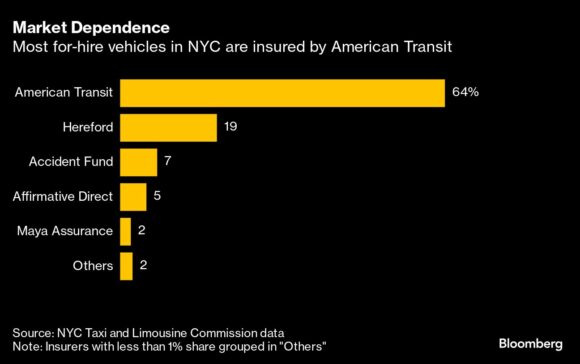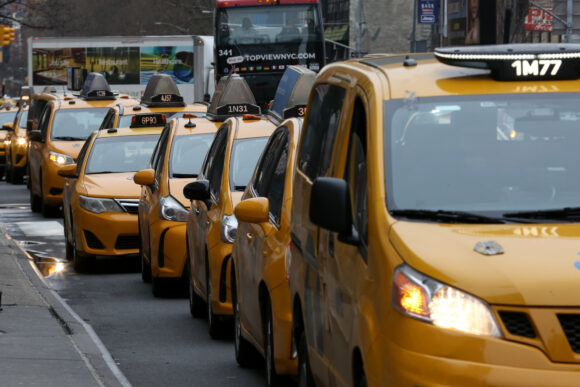In an unassuming white and blue office building in Freeport, a few miles into Nassau County, sits the headquarters of American Transit Insurance Co.
The 52-year-old, family-owned firm is hardly a household name, but it’s vital to how New Yorkers zip around the city. American Transit, also known as ATIC, insures roughly 60% of New York City’s more than 117,000 commercial taxis, livery cabs, black cars and rideshare vehicles.
It’s also insolvent.
Run by Ralph Bisceglia, ATIC has for decades been the dominant player in New York City’s commercial car insurance market, the largest in the country, offering cabbies premiums far lower than other insurers. In the second quarter, it posted more than $700 million in net losses, according to a filing with the National Association of Insurance Commissioners.
“To see this kind of loss of this size — there are few precedents,” said Tim Zawacki, a senior analyst at S&P Global Market Intelligence, who has covered the insurance industry for 25 years. “If this company is going to be unable to continue business, there’s going to be significant fallout in terms of who is going to insure all of these drivers.”
Update: NYC’s Largest Cab Insurer Ordered to Explore Sale After Losses
Christopher Ryan, ATIC’s chief financial officer, and other company representatives did not respond to multiple email and telephone requests for comment.
The losses follow years of warnings from industry analysts, and disagreements between ATIC and its third party actuary. The company’s reserves have been considered deficient for decades, said Zawacki, and the problem has come to a head as the company wrestles with larger claim sizes driven by bigger settlements as well as jury and arbitration awards. A potential ATIC failure would mean tens of thousands of taxi drivers without insurance, throwing the city’s complex transit ecosystem into turmoil, taxi industry experts and former regulators said.
The insurer’s losses grew so large that they have crossed a threshold known as a “mandatory control level event,” according to a Dec. 31 report by Huggins Actuarial Services, a consultant hired by ATIC. New York’s Department of Financial Services — which regulates insurers — could now be forced to step in to place the company into receivership or liquidate it.
DFS told Bloomberg it has been “working with the company and other stakeholders to address these longstanding financial issues, and protect drivers, passengers and the stability of the New York livery insurance market.”
‘Too Big to Fail’
“There is a perception that they are too big to fail,” said Andrew Don, chief operating officer of Research Underwriters, a transportation insurance broker. If that happened, “there would be a large void in the ability to get a taxi or an Uber or a Lyft or a limo in New York as all of these vehicles would suddenly be without insurance.”
“The only other insurance carriers that would be able to pick them up currently would possibly struggle with the volume of business,” Don said. In that case, “every taxi driver or limo driver is going to have a significant increase in their insurance premium” as rates adjust to reflect real risk, he said. That could upend an industry already battered by headwinds including increased competition and plunging medallion values.
In response to questions, the city’s Taxi and Limousine Commission said it is in close contact with the DFS and meets with it regularly “to provide expertise and emphasize the importance of affordable insurance to the industry.” It directed Bloomberg to the DFS for comment on ATIC.
While ATIC is required by the state’s DFS to submit to an examination every five years, there are no publicly available exam reports for the company. A 1986 DFS evaluation obtained by Bloomberg described ATIC as insolvent by $6 million.
“DFS has to step in and do something,” said Matthew Daus, a partner at law firm Windels Marx and the former chairman and commissioner of New York City’s Taxi and Limousine Commission. The company’s latest financial filing paints a picture so dire that it’s “creating unrest in the industry,” said Daus, who founded Windels Marx’s Transportation Practice Group.
ATIC has been underpricing insurance for decades, snapping up business from competitors, Daus and other transit and insurance industry officials told Bloomberg.

“The premiums that they were charging were not commensurate with the risk they were taking on,” Research Underwriters’s Don said.
It raises questions over ATIC’s ability to pay claims. Uber Technologies Inc. sued ATIC in federal court in February, accusing the insurer of “a pattern and practice of failing to adhere to reasonable claims-handling practices and failing to reasonably resolve claims,” resulting in 23 lawsuits brought against Uber and its drivers over crashes involving bodily injuries. That left the ride-share giant to pay “substantial amounts” to defend itself.
Read more: Uber Sues Insurer for Refusing to Cover NYC Drivers in Crashes
ATIC attorneys denied the allegations, and the suit is ongoing.
In 2021, the actuarial consultant Huggins found the company was roughly $500 million short of the money considered necessary to cover its unpaid losses and loss-adjustment expenses. That kind of determination, S&P reported at the time, is exceptionally rare.
“If corrective action is not successfully implemented by the company and further adverse development continues, the possibility exists the company could be placed in some form of receivership or liquidation,” Ronald Kuehn, a consultant at Huggins, wrote.
ATIC’s Ryan responded to S&P that he didn’t agree with Huggins’ opinion because of the “unique nature” of the New York market.
Zawacki described the latest losses as “pretty staggering in terms of its magnitude” and said it will create unique challenges for the regulators.
“Any decision they make is going to have significant implications for passengers and drivers,” he said.
Photo: Taxis wait to pick up commuters outside Pennsylvania Station in New York.
Related:
Was this article valuable?
Here are more articles you may enjoy.



 Experian Launches Insurance Marketplace App on ChatGPT
Experian Launches Insurance Marketplace App on ChatGPT  World’s Growing Civil Unrest Has an Insurance Sting
World’s Growing Civil Unrest Has an Insurance Sting  Florida Regulators Crack the Whip on Auto Warranty Firm, Fake Certificates of Insurance
Florida Regulators Crack the Whip on Auto Warranty Firm, Fake Certificates of Insurance  AIG’s Zaffino: Outcomes From AI Use Went From ‘Aspirational’ to ‘Beyond Expectations’
AIG’s Zaffino: Outcomes From AI Use Went From ‘Aspirational’ to ‘Beyond Expectations’ 

